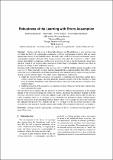Robustness of the Learning with Errors Assumption
Author(s)
Goldwasser, Shafi; Kalai, Yael Tauman; Peikert, Chris; Vaikuntanathan, Vinod
DownloadGoldwasser-Robustness of the learning.pdf (222.0Kb)
OPEN_ACCESS_POLICY
Open Access Policy
Creative Commons Attribution-Noncommercial-Share Alike
Terms of use
Metadata
Show full item recordAbstract
Starting with the work of Ishai-Sahai-Wagner and Micali-Reyzin, a new goal has been set within the theory of cryptography community, to design cryptographic primitives that are secure against large classes of side-channel attacks. Recently, many works have focused on designing various cryptographic primitives that are robust (retain security) even when the secret key is “leaky”, under various intractability assumptions. In this work we propose to take a step back and ask a more basic question: which of our cryptographic assumptions (rather than cryptographic schemes) are robust in presence of leakage of their underlying secrets?
Our main result is that the hardness of the learning with error (LWE) problem implies its hardness with leaky secrets. More generally, we show that the standard LWE assumption implies that LWE is secure even if the secret is taken from an arbitrary distribution with sufficient entropy, and even in the presence of hard-to-invert auxiliary inputs. We exhibit various applications of this result.
1. Under the standard LWE assumption, we construct a symmetric-key encryption scheme that is robust to secret key leakage, and more generally maintains security even if the secret key is taken from an arbitrary distribution with sufficient entropy (and even in the presence of hard-to-invert auxiliary inputs).
2. Under the standard LWE assumption, we construct a (weak) obfuscator for the class of point functions with multi-bit output. We note that in most schemes that are known to be robust to leakage, the parameters of the scheme depend on the maximum leakage the system can tolerate, and hence the efficiency degrades with the maximum anticipated leakage, even if no leakage occurs at all! In contrast, the fact that we rely on a robust assumption allows us to construct a single symmetric-key encryption scheme, with parameters that are independent of the anticipated leakage, that is robust to any leakage (as long as the secret key has sufficient entropy left over). Namely, for any k < n (where n is the size of the secret key), if the secret key has only entropy k, then the security relies on the LWE assumption with secret size roughly k.
Date issued
2010-01Department
Massachusetts Institute of Technology. Computer Science and Artificial Intelligence LaboratoryJournal
Proceedings of the Innovations in Computer Science 2010
Publisher
Tsinghua University Press
Citation
Shafi Goldwasser, Yael Kalai, Chris Peikert and Vinod Vaikuntanathan. "Robustness of the Learning with Errors Assumption" Innovations in Computer Science, 2010, 230-240.
Version: Author's final manuscript
ISBN
978-7-302-21752-7